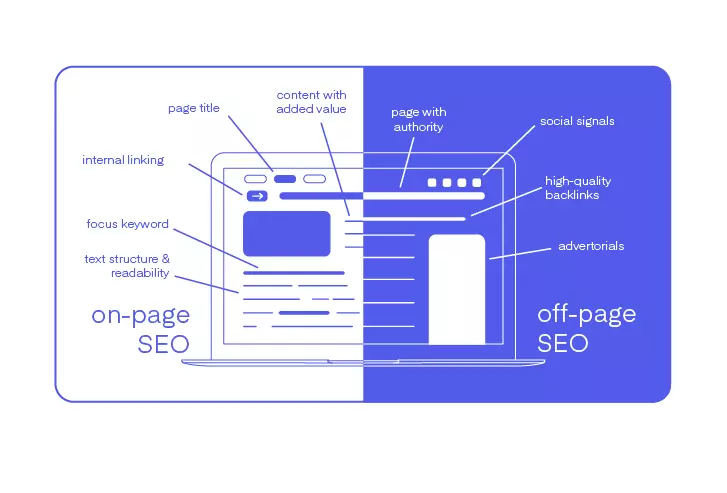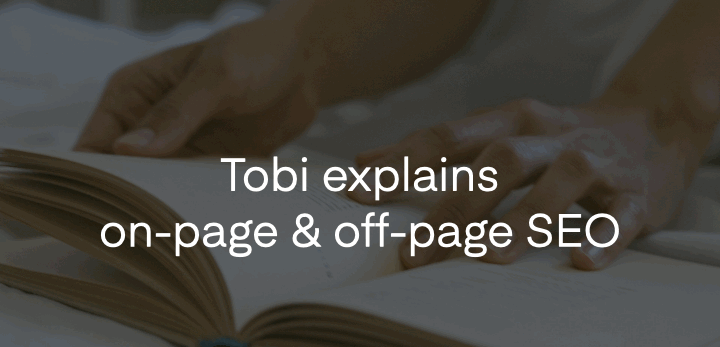Tobi explains - OnPage & OffPage SEO
In the first blog post of "Tobi explains", the basics of search engine optimization were explained. Now, in the second part of the "Tobi explains" series, we want to look at on-page and off-page search engine optimization. We will discuss the most important differences and the relevance of these two measures.
You can find the video to accompany this blog post here:
What is on-page SEO?
As part of search engine optimization (SEO), on-page SEO includes all measures that take place on a company's own website. This includes the optimization of content, such as texts, videos, images, but also places in the code. The most important SEO OnPage aspects are considered below.
Content with added value
One of the most important factors is added value: the content that is presented should offer visitors to the website added value. This can be by answering questions or providing further helpful content. This leads to users spending more time on the website and linking or sharing content.
In order to provide appropriate content, it is worth researching which content already exists on a particular topic and which is relevant. It makes sense to write about something for which there is not yet so much content to be found or to shed light on existing topics from a different perspective.
Focus on a keyword
Another factor is to focus the content on one keyword. This does not have to be a single word, but can also be a search phrase, also known as a long-tail keyword. However, a keyword should not be used excessively. So-called keyword stuffing can otherwise have negative effects: The ranking can deteriorate and the user experience can be negative.
The following rule of thumb is worth remembering: The selected keyword should be used in the page title, in the main heading (H1) and in the first 100 words of a text.
Choosing an optimal page title
The page title is the text that can be seen, for example, when a page is opened in a browser tab. At the same time, it is also the heading of a web page that is displayed in SERPs, Google's search results pages.
Ideally, it is 55 characters long, contains the selected keyword of the website and, if possible, a call to action. The page title is located in the code and is therefore not visible on the website itself.
In addition to the page title, the meta description is also often discussed. This descriptive text is located below the title in the search results. Although it is not a direct ranking factor, it should still be well written to encourage users to click on the website.
Use internal linking
Internal linking is an often overlooked but important SEO measure that helps search engines to capture and evaluate content. This involves linking to suitable content on the company's own website.
Assuming a text is written about drilling machines, it makes sense to link to suitable accessories including the appropriate keyword in the link. Designations such as "Find out more" should be avoided and descriptive links formulated instead. It would be much better to use the link title "Find the right drill chuck here".
A good text structure and readability
Another measure that is easy to implement is a good text structure. A clear hierarchy of headings should be recognizable, whereby the H1 tag is particularly important. Enumerations and highlighting are also helpful in making texts more readable and giving users a better overview.
Nested sentences and foreign words should be avoided and texts should be written according to the target group. Tools that check the readability of texts often rate website texts negatively, especially in the B2B environment. This is because a certain level of knowledge of the target group is assumed and different technical terms are used. However, in order to write texts that are as comprehensible as possible, technical terms should be explained as simply as possible.
It is now clear what on-page SEO is and what measures need to be implemented to ensure proper SEO success. But how exactly does OffPage SEO differ from this?

High-quality backlinks
Backlinks are an important factor in off-page optimization. Google follows all links it finds with its program, the crawler. If content is linked to by many other websites, it appears to be more important than a website that is not linked to. This means that your own website is rated more important and therefore ranks better.
As it used to be possible to buy many links, which meant that sites were ranked higher, Google changed the algorithm and now also looks at how high-quality the respective backlinks are. Care should therefore be taken to ensure that the backlinks are always of high quality. Although these are more expensive, backlinks are heavily weighted ranking factors.
For search engine optimization, it is also important that backlinks do not only consist of start page links, i.e. so-called surface links. Subpages with relevant topics should also always be linked, i.e. deep links.
Choosing a page with a lot of authority
If links are built through collaborations or articles published on other media, a site with a lot of authority should be selected. This means that a renowned trade magazine will always be a better alternative than an unknown blog. This authority is reflected in many quality backlinks and well-created content.
Advertorials
A guest article or advertorial is a good way to get started with OffPage SEO. This term is made up of the words advertisement and editorial. It thus combines the aspect of advertising and the aspect of editorial presentation.
It is important to note that an advertorial must be marked as an "advertisement". Advertorials can be booked. It makes sense to write on a topic relevant to the company or on a topic in which there is expertise.
Social signals as a supplement
Social signals are the easiest way to build backlinks these days. Your own website is linked via the respective social media channels, such as Instagram or LinkedIn. However, these backlinks are not rated as highly, so they are not a hard ranking factor.
In summary, it can be said that there are various starting points that can be considered in on-page and off-page SEO. Both measures aim to improve the ranking of your own website.
In addition to on-page and off-page SEO, technical SEO is another important optimization measure. This includes, for example, low loading times or a technically error-free website, which also improves the user experience (UX). We explain exactly how technical SEO works in the third part of our SEO series "Tobi explains".
All articles in the new knowledge format "Tobi explains" can be found here:
